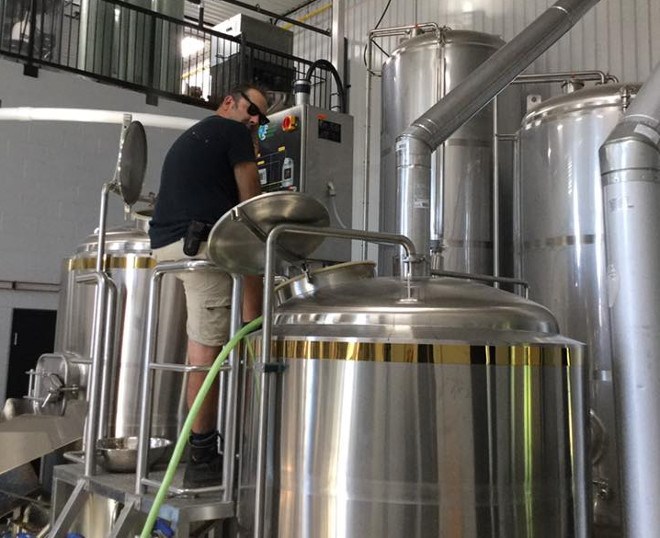A year after opening their expanded brewery in South River, the owners at Highlander Brew Co. are slowly gaining a greater share in the craft beer market and eagerly anticipating the launch of their new training program.
Oct. 1 will mark the one-year anniversary of the opening of the new facility, which includes a community event space, and allows Highlander to brew 10 times its previous capacity.
“We are blessed over almost anybody else in the industry inasmuch as we got to design the building from the very basics, whereas most people bought a building and then had to renovate,” said Dwayne Wanner, co-owner at Highlander Brew Co.
“So, it works out for us. We’re quite happy with it.”
The initiative is a unique association between Highlander and the Village of South River.
The community provided the site, and $2 million from the Northern Ontario Heritage Fund Corp. and FedNor helped pay for the construction of the building.
The community owns the facility, and Highlander leases the space from the community.
It includes the brewing room, an event space, which is available to use free of charge, and a shop where visitors can pick up brewery-related souvenirs and local craftworks.
A symbiotic relationship between village and brewery has emerged: the brewery creates much-needed economic development and awareness for the village, while community members help promote the beer and fill the facility with patrons.
“We need the community to help us promote our beer, and they in turn need a space, so it’s kind of a tradeoff,” Wanner said.
Since it launched, the facility has been abuzz with activity.
The first dinner — a fundraiser for Habitat for Humanity — raised $10,000 for charity.
Other events have included dinner theatre put on by a local troupe, jazz concerts, business meetings, private parties, art shows, training seminars, and even a performance by a string quartet comprised of members of the North Bay Symphony Orchestra.
The facility is currently working on amending its liquor licence so that it can serve wine in addition to beer, which will allow event organizers to appeal to an even broader audience.
Because Highlander is only brewing at 30 per cent capacity, it’s also helping out fellow brewery New Ontario Brewing meet demand.
The main brewing operation has been designed to run with just three people per shift, but it currently employs 10, an increase of eight employees from the former location.
Distribution remains a challenge for the brewery, which produces six varieties, all of which bear names inspired by the Almaguin highlands.
“We only have two beers in the LCBO — the Blacksmith Smoked Porter and the Scottish Ale — so to overcome that, we went online,” Wanner said.
“We have to reach out beyond our region, so people can go online on our site and order beer, and we deliver anywhere in the province.”
Next, Highlander will be the site of the province’s first brewery technician training program.
Working in partnership with CTS Canadian Career College out of North Bay, Highlander is developing a seven-month course, which will include online and on-site learning components.
At the end, graduates will be trained to make the beer, manage the plant, and sell the product.
For the first three months, participants will take their coursework online, and for the remaining four months, students will complete their practical component, working at a craft brewery somewhere in the province.
“Originally, we thought we would do two to three people at a time, but now we’re set up to do 30 at a time, because the industry really responded when I went to the craft beer industry (with the idea),” Wanner said.
“Nobody has any training programs, so they all have to do it themselves, so they really caught on to this.”
With 250 craft breweries in Ontario, which all need trained people in their facilities, Wanner said there will be no shortage of work available for students once they graduate as brewery technicians, a job that pays a starting salary of around $35,000.
A joint application for the course has been submitted for review to the Ministry of Advanced Education and Skills Development.
Wanner expects approval this fall enabling the course to be offered as soon as January, 2018.




